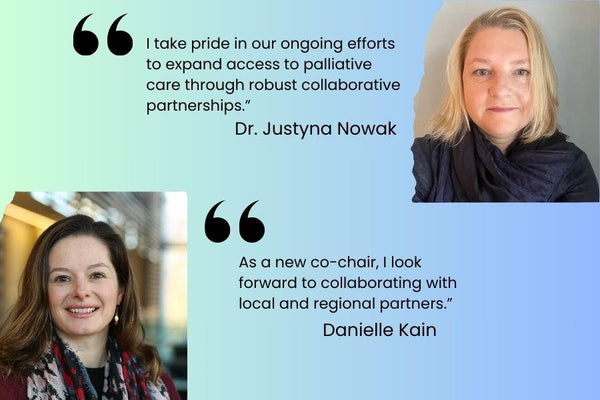
Palliative Care Working Group achievements in 2023

Palliative Care Working Group is dedicated to enhancing the quality of life for individuals facing serious illnesses and their families. Our focus is on fostering a positive, integrated care experience for palliative care providers, to increase home visits to reduce Emergency Room admissions.
"In my role as a co-lead within the Palliative Care Working Group, I take pride in our ongoing efforts to expand access to palliative care through robust collaborative partnerships. In 2023, we successfully matched 40 individuals without a family doctor, giving them access to essential palliative care services,” says co-chair Dr. Justyna Nowak.
"As a new co-chair, I look forward to collaborating with local and regional partners," says Danielle Kain, co-chair of the Palliative Care Working Group and Clinical Director of Palliative Care at Providence Hospital. "Our focus in 2024 will continue to support a palliative approach to care, especially to marginalized populations in our region, including Indigenous communities and individuals facing housing insecurity."
Over the past year, the group has achieved notable success in three key projects, which will continue in 2024:
- Indigenous Palliative Care Strategies - The objective is to identify palliative care strategies for Indigenous Peoples. This initiative aims to enhance awareness and ensure equitable access to culturally safe, Indigenous-focused palliative care services within the region.
- Under-serviced and Vulnerable Population Palliative Care Strategies - This project is designed to enhance palliative care access for underserved and marginalized populations, particularly people who are experiencing homelessness and vulnerably housed. We are developing an integrated system that provides timely, high-quality palliative care aligned with individual values, needs, and preferences. The ultimate goal is to improve patient and caregiver experiences.
- Palliative Care Primary Care Strategies:
- Ongoing education and support of primary palliative care providers.
- Emphasis on promoting the early identification of patients who would benefit from a palliative care assessment and approach to care. This is being evaluated with a pilot project of embedded palliative care specialist clinics at Maple and Greenwood sites.
- Other efforts include matching individuals without a family doctor, giving them access to essential primary palliative care services when needed
